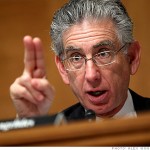Insiders Blame Financial Panel Rift on Dem Chair
 Members of the Financial Crisis Inquiry Commission are pointing the finger at Chairman Phil Angelides for the panel's missteps.
Members of the Financial Crisis Inquiry Commission are pointing the finger at Chairman Phil Angelides for the panel's missteps.
The Financial Crisis Inquiry Commission was supposed to provide a bi-partisan explanation of the causes of the financial crisis, in a style similar to the 9/11 Commission Report. Instead, the body has failed to produce a document when it originally planned to and has now become part of the partisan divide that permeates across Washington. Some reporting has placed blame for this at some of the Republican members of the commission, but one commissioner who spoke to FrumForum said that it was the chairman Phil Angelides’ lack of leadership and focus which has failed to create a consensus.
The commission was originally going to produce a report for December 15th but announced that it would be delaying its release until January. In response, four of the Republican Commissioners voted against moving the date of the final report and have released their own document.
In in an interview with FrumForum, one of the commission members said their "Financial Crisis Primer" was not meant to replace the final report. Instead it was "suggestive of the kinds of issues a report should cover." The seven-page primer focuses on the role of Fannie Mae and Freddie Mac in supporting the housing bubble and how government regulation encouraged the bubble to grow. While some Commissioners have told other publications that they felt that the attention on Fannie Mae and Freddie Mac was too narrow, the Commissioner who spoke to FrumForum described a lack of leadership and an unwillingness to bring focus to the proceedings. (This is especially problematic since the commission had a mandate to investigate 22 different causes of the crisis.)
A significant amount of criticism was directed at Chairman Phil Angelides’ management of the committee. Angelides was criticized both for his micromanagement, and for his inability to listen and generate consensus.
The commissioner stated that the Chairman was preventing the committee from focusing on what caused the crisis, and was instead trying to "throw everything against the wall" a process which he described as "analytically unsatisfying." Politico has reported that the commission was allegedly giving time to discuss topics that were not direct causes of the crisis, such as income inequality.
The commissioner also noted tension over Angelides' decision to produce a book-length version of the commission report. While a book deal had been negotiated between the Chairman and the Vice-Chairman, Angelides' own book deal was reportedly not part of broad consultation. The process of determining the book deal is reportedly "far from transparent."
Several news organizations are reporting on Democratic frustration that other members of the commission did not always show up for meetings. However, the commissioner who spoke with FrumForum said that this was a symptom of broader mis-management, "I have attended every meeting that I could" he said, "When the chairman simply sends out new meeting times and never checks if you can make them, you're going to have a problem."
The commissioner felt that it was this failure of leadership which ultimately led to a delay of the final report, and a difficulty in reaching a consensus. While he acknowledged that there were "different points of view" about the crisis, he felt that they were not partisan disagreements, and that the commission had the potential to have been constructive.
Update:
In addition to the reports that FrumForum has received, commissioner Keith Henneesy has also taken to his blog to discuss the fallout that has struck the Financial Crisis Inquiry Commission. His frank remarks give a bit more insight into the breakdown of the panel, and the commission Chair’s seemingly misguided preoccupation with a book deal.
Perhaps the most important point Hennessey makes is that the there is a strong tension between the commission's mandate to produce a report on the crisis, and the Chair's interest in having a popular book published:
Last week the Commission voted, again 6-4 along party-appointed lines, to limit the minority’s opportunity to express our views in the commercial book version of the upcoming report. In a 512 page book that will be for sale at commercial bookstores, those who dissent are now allotted nine pages each. We will be allowed to express our views without restriction in the official GPO version of the report (which will be transmitted to the President and the Congress) and on the commission’s website, but those views will be limited or truncated in the commercial version. I suggested increasing the length of the commercial book to allow room for our full additional views but was turned down because it might add $1 to the sale price of the book. This is, to say the least, frustrating.
If true, this is a very troubling development. There has been the suggestion that the book deal was an attempt to replicate the success of the 9/11 commission report. However, the mandate of the commission is to provide an overview of the causes of the financial crisis, not to write a New York Times bestseller or be concerned with the book's profit margins. Whatever the substance of the policy disagreements, it’s clear focusing on the book's profitability, and stymieing the minority's report is not helpful in building a productive atmosphere on the committee.
Posted December 16, 2010 at 12:20pm
Tweet
Follow Noah on Twitter: @noahkgreen